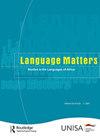尼日利亚虚拟社区中约鲁巴民族分离主义话语的意识形态立场
IF 0.8
3区 文学
0 LANGUAGE & LINGUISTICS
引用次数: 0
摘要
摘要本研究从立场和意识形态的角度考察了约鲁巴民族分离主义运动对三个受欢迎的尼日利亚虚拟社区的影响:Nairaland、Gistmania和Naijaloaded。数据被置于评价框架和批判性话语分析的理论和分析范式之下。研究中发现了两种声音:反约鲁巴民族的声音和亲约鲁巴国家的声音。反约鲁巴民族的声音投射出三种意识形态:改革主义、保守主义和悲观主义,而亲约鲁巴国家的声音则投射出分离主义和专制主义意识形态。这些意识形态结构通过评价子系统和话语策略的重叠实例进行索引,这些策略包括透视、提名、负面评价归因、去个人化隐喻、强化和互文性。大多数参与者压制对立的立场,对分离主义运动表现出作者的意识形态立场。鉴于分离主义立场的分裂性质,作为主要话语模式的煽动性和攻击性表达不利于促进种族间和谐、爱国主义和民族融合。本文章由计算机程序翻译,如有差异,请以英文原文为准。
Ideological Stances in Yoruba Nation Secessionist Discourse in Nigerian Virtual Communities
Abstract This study examined the Yoruba nation secessionist agitation from the viewpoint of stance and ideology in its discursive engagement on three popular Nigerian virtual communities: Nairaland, Gistmania, and Naijaloaded. Data were subjected to the theoretical and analytical paradigms of appraisal framework and critical discourse analysis. Two voices were identified in the study: the anti-Yoruba nation and the pro-Yoruba nation voices. The anti-Yoruba nation voice projected three ideologies: reformist, conservativist, and pessimist, while the pro-Yoruba nation voice projected separatist and arbitrationist ideologies. These ideological constructs were indexed by overlapping instances of appraisal subsystems and discursive strategies of perspectivisation, nomination, negative evaluative attribution, depersonalising metaphors, intensification, and intertextuality. Most participants suppressed antithetical stances to project an authorial ideological stance on the secessionist movement. Given the divisive nature of the secessionist stance, inflammatory and aggressive expressions as dominant discursive patterns are inimical to the efforts to promote inter-ethnic harmony, patriotism, and national integration.
求助全文
通过发布文献求助,成功后即可免费获取论文全文。
去求助
来源期刊

Language Matters
Multiple-
CiteScore
1.20
自引率
0.00%
发文量
19
期刊介绍:
The purpose of Language Matters is to provide a journal of international standing with a unique African flavour focusing on multilingualism in Africa. Although the journal contributes to the language debate on all African languages, sub-Saharan Africa and issues related to multilingualism in the southern African context are the journal’s specific domains. The journal seeks to promote the dissemination of ideas, points of view, teaching strategies and research on different aspects of African languages, providing a forum for discussion on the whole spectrum of language usage and debate in Africa. The journal endorses a multidisciplinary approach to the study of language and welcomes contributions not only from sociolinguists, psycholinguists and the like, but also from educationalists, language practitioners, computer analysts, engineers or scholars with a genuine interest in and contribution to the study of language. All contributions are critically reviewed by at least two referees. Although the general focus remains on multilingualism and related issues, one of the three issues of Language Matters published each year is a special thematic edition on Language Politics in Africa. These special issues embrace a wide spectrum of language matters of current relevance in Southern Africa.
 求助内容:
求助内容: 应助结果提醒方式:
应助结果提醒方式:


